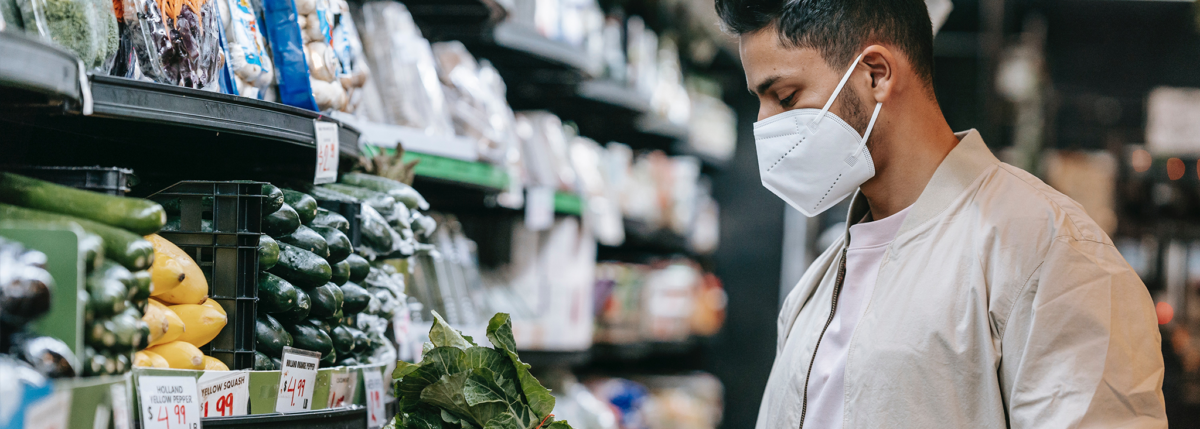Here’s Why the CDC Updated Their Mask Recommendations (Again)
Editor’s Note: We have a simple goal: tap into the power of the global diabetes community to save lives. Visit coronavirusdiabetes.org to learn more about what you can do as a person with diabetes to keep yourself and others safe from COVID-19 until we’re all safe.
This article was published on Tuesday, August 3, 2021.
On Tuesday, July 26, 2021, the Centers for Disease Control (CDC) in the United States issued new masking recommendations amidst increased rates and much more dangerous variants of COVID-19 in the US. There are two big and related reasons why:
- Masks are the most effective way to slow the spread of COVID-19, no matter your vaccination status. This is particularly important in places with high transmission rates; you can check your county’s rate here.
- We are in a fourth surge of COVID-19 in the United States, with hospitalization rates surging to higher than when the pandemic began. This is due to the more contagious and more dangerous delta variant of COVID-19.
Who needs to be wearing a mask and when?
Everyone, particularly when you’re in indoor public spaces (because you’re breathing in other people’s air, and they’re breathing in yours).
If you’re vaccinated, wearing a mask can protect you and others from breakthrough cases. Breakthrough cases (where a vaccinated person gets the COVID-19 disease) are rare, but vaccinated people can still carry the coronavirus to others without having any symptoms. Luckily, vaccinations still make a massive difference—people who are vaccinated are less likely to carry coronavirus and are extremely unlikely to experience any severe symptoms from the disease.
If you’re not vaccinated, this is to protect yourself and others, as you can carry high levels of COVID-19 to others even if you don’t get sick yourself. However, even if you’re an otherwise healthy person, it’s important to keep in mind just how much more dangerous the new variants of COVID-19 are.
These variants will continue to develop rapidly until almost everyone is vaccinated—because they have so many hosts in which to thrive—and they are more contagious than the original COVID-19 variant. This is due to how viruses mutate (all viruses do this; it’s why we have new flu vaccines every year to address new variants of the flu). And because so many people are still unvaccinated, the virus has lots of places to thrive and change, making it more contagious and more dangerous.
Why do vaccinated people need to wear a mask in indoor public spaces?
The delta variant can live in small amounts in people who are vaccinated, so even with no symptoms of COVID-19 ourselves, vaccinated folks can still pass the virus to other people.
This is particularly dangerous for the elderly or ill who have already been vaccinated but cannot afford to take on the high viral load of the delta variant and for children who are not yet eligible to be vaccinated.
To combat high transmission rates, several cities have already instituted mask mandates again, like Washington, D.C., Savannah, GA and St. Louis, MO.
What can we do to protect ourselves and others from the new variants?
Getting vaccinated against COVID-19 and continuing to wear masks in indoor public spaces are the most impactful things we can each do to protect ourselves and others. Doing so right now matters, as we do not want to give the novel coronavirus more time to continue mutating beyond what we know how to prevent and treat. We have the tools to stop the current COVID-19 variations but they mean nothing unless we all use them now.
What if I’m too healthy to get COVID-19?
Particularly if you have diabetes, you pay so much attention to your health, and you already do so much to make sure your system is healthy and strong. But think about this—hospitals are getting overwhelmed by COVID patients again, which means they cannot provide care for anyone else who needs it. Check out this statement from the chief medical officer of Our Lady of the Lake Hospital in Louisiana.
Even if you don’t get COVID-19, can you absolutely guarantee that you won’t have a diabetes issue that needs medical help? That you won’t get in an accident where you need the emergency room? What if you just get the normal flu and you need IV-fluids, but there aren’t enough medical professionals to help you because they’re all dealing with COVID patients?
COVID-19 is a disruptor to our entire medical system. Protecting yourselves and others against it by getting the vaccine is the best way to ensure that you and your loved ones will be able to get the care they need, when they need it.
When will this end?
When the vast majority of people are vaccinated against COVID-19, giving the virus no more places to hide and mutate into stronger and more dangerous versions.
Do your part. Get vaccinated. If you’re hesitant about them or want to learn more about their safety, read this piece clarifying a few myths about the vaccines, or this piece explaining how mRNA vaccines work.
For more information on the COVID-19 vaccines for kids, read this.





